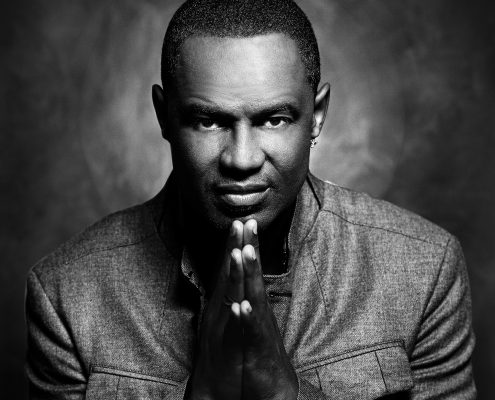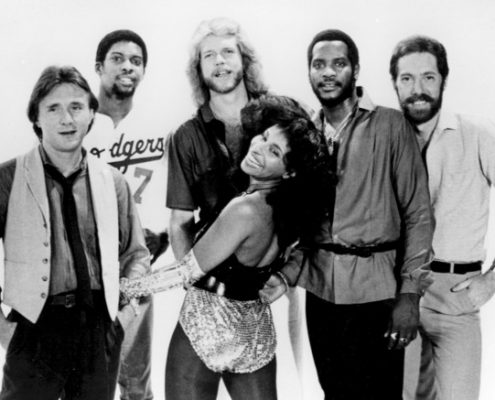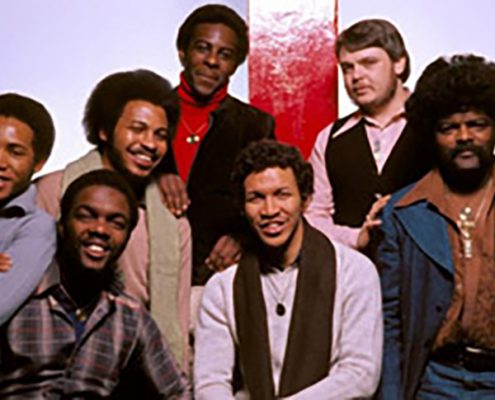

About Musiq SoulChild
The aim for this record ,” says Musiq Soulchild about “LUVANMUSIQ ,” his first album for Atlantic Records , “is basically to reintroduce myself.”
As if he really needs an introduction. After debuting in 2000 with the brilliant “AIJUSWANASEING ,” and following that up with “JUSLISEN” (2002) and “SOULSTAR” (2003) , Musiq Soulchild became known for creating some of the most compelling soul of the new millennium. Crafting ear-caressing tracks that blended old-school soul fervor with new-school hip-hop rhythms , he went on to sell three million albums in the U.S. alone , gathering a string of major awards in the process.
It is Musiq ‘s quiet devotion to his sonic impact as a musician that drives the man to want to re-introduce himself , to set up his return to the airwaves and the clubs as a new beginning of sorts , and not take for granted his status in the music industry. “I’ve been away for a little while ,” he says. “The industry ‘s changed and so have I personally , mentally , psychologically. I look at my previous three albums as grade school , middle school , and high school. Now with this new album, “LUVANMUSIQ ,” its like I ‘m going off to college.” And college never sounded so good.
If college is that place where you learn who you are and what you want to contribute to the world , “LUVANMUSIQ” is the album Musiq Soulchild was meant to make , crammed with full-bodied tracks that take soul music to the high level he has always reached for. From the funky , hip-hop-inflected , “Heartbeat”-throwback “Buddy ,” to the stunningly beautiful “Teach Me” and the Stevie Wonderesque “Questions ,” “LUVANMUSIQ” is a generous , open-armed declaration of heart and soul. It is a collection full of the musings of a man who appreciates the perks of maturity , and who doesn’t have time for the child-like games and sounds that seem to define so much modern music.
It sounds like the music of a Man , a man trying to maintain , a man not driven by the more youthful priorities that seem to dominate music today. Which is exactly what Musiq was aiming for. “I like to write and perform songs that have a more realistic perspective on things ,” says Musiq. “A lot of people use songs for escapism and poetic aesthetics , but I would like to think that humanity has evolved. I would like to inspire people to start thinking that way. Look , man ,” he adds with a laugh , “I ‘m not twenty-one anymore , so I ‘m not talking about that same stuff.” What he is doing is trying new things.
Check out “Buddy ,” featuring the MC-ing of one of the best singers that modern R and B has to offer. “I ‘m kind of easing my way into MC-ism , even though I’ve wanted to do it for a loooong time ,” says Musiq. “I hadn’t really warmed up to it before because I respect the craft. It ‘s not something you can just jump into and do. I love hip-hop , the idea of it. I love the culture of it , the basics and the foundation of it. And I want to contribute to that culture. Bit by bit , I ‘m doing my best to contribute to the culture because there ‘s more to me musically than what has been put out there.”
There ‘s more to Musiq on many , many levels. The Philly native , the oldest of nine kids (and the self-described “black sheep of the family”) , found himself homeless after dropping out of high school at seventeen. Knowing what he knows now , he believes he could have handled things differently. “I could have used that forum to my advantage ’cause there were people whose job was to teach me ,” he says now. But at the time he just “felt patronized. When you ‘re young , you just want what you want and you don ‘t see better.” Much to his parents ‘ chagrin , he found himself working menial jobs and sleeping on friends ‘ couches just to get by. But even when things were at their worst, when he couldn’t find a friendly sofa , for instance, and found himself sleeping on the train or on a bench in the park. Musiq found a creative way to get himself through the hard times.
“It’s crazy ,” he remembers , “because when I look at my life now , I realize it was pretty bad back then , but I didn’t look at it like that. You can call it wishful thinking or you can call it neurotic , I don ‘t know and I don ‘t care , but I knew that it was all just a movie and I was just going through the part of the movie where I was down. You couldn’t tell me different; I just knew. That ‘s how I chose to look at it.”
But even at the worst of times , there was always music. He remembers playing dresser-piano and air guitar when he was a kid , and singing along to his father ‘s Stevie Wonder and Donny Hathaway records before he really knew what they meant. But then he realized that “I can sing. I just looked at it as something I could do and something I wanted to get better at and something I could get attention from.”
So much attention , in fact , that the thing he loved, the thing he was known for when he was gigging around Philly and hanging out with other musicians, became his actual name: Musiq. “There were people who knew of me but didn‘t really know me; they just knew me as that music dude. ‘ So after getting that so much , I was like “Just call me Musiq”. It was so fresh to me because if I had to be called anything , I would have wanted to be called Music. That ‘s how much I dug it; when you see me , I want you to automatically think of music.” And the Soulchild? “Musiq Soulchild is technically two ideas. Musiq is the front man and Soulchild is the idea behind it. It ‘s basically me as an artist in this generation , representing the traditions and the legacies of the past soul stars.” Legacy: The best artists understand it , cherish it , revel in the possibilities of adding their own struggles and voice to the continuing legacy and love of music that defines what caresses the ears of the world. Musiq Soulchild, whose new CD contains lyrics that get right to the heart of that legacy (“Show me the way to surrender my heart … Teach me how to love”), understands that idea more than most. Music , for Musiq , is salvation , love , mystery , community , life. And he appreciates his position within it. “I have to lead by example ,” he says. “So many artists bitch and complain , but I ‘m like , “Dude , what are you doing to contribute to the change?”. I‘m manning up and contributing to the change. And hopefully I will inspire enough people who are willing to help contribute to the change. The change I ‘m trying to contribute to is about things going back to how they used to be not just because stuff was great then , but so that we can take it to another level , in the present as well as the future.”
Inspired by such icons as Stevie Wonder , James Brown , and Ray Charles , Musiq made a blockbuster debut right out of the gate with 2000 ‘s acclaimed “AIJUSWANASEING.” Fueled by the breakthrough singles , “Just Friends (Sunny)” and “Love ,” the album went on to earn RIAA platinum for sales exceeding 1 million. In addition , Musiq was honored with a number of awards , including Billboard Music Awards for “Best New Artist ,” “Top R and B Artist ,” “Top R and B Male ,” and “Top R and B Single” (for “Love”); the Soul Train Music Award for “Best R and B/Soul Single” (for “Love”); and the ASCAP Rhythm and Soul Award for “Top R and B/Hip-Hop Song” (for “Love”). Further nominations came from the Grammy Awards , American Music Awards , The Source Awards , BET Awards , and NAACP Awards.
In May 2002 , Musiq unveiled his second album , “JUSLISEN ,” which entered both the Billboard 200 and Billboard ‘s “Top R and B/Hip-Hop Albums” chart at #1. The collection , which featured a pair of hits in “Dontchange” and “Halfcrazy ,” was soon certified RIAA platinum and again earned Musiq a variety of prestigious awards. Among the trophies were Soul Train Awards for “Best R and B/Soul Album” and “Best R and B/Soul Single” (for “Dontchange”); an ASCAP Rhythm and Soul Award for “Award Winning Song” (for “Dontchange”); and a BMI “Urban” Award (for “Halfcrazy”). What ‘s more , Musiq received nominations from the Grammy Awards , MTV Video Music Awards , BET Awards , NAACP Awards , and Billboard Music Awards.
“SOULSTAR ,” Musiq ‘s third album , arrived one short year later and he was once again greeted with both critical and popular success. Hailed as one of the year ‘s finest collections of contemporary R and B , the album featured two radio smashes , “Forthenight” and “Whoknows.” The winner of the Soul Train Awards ‘ “Best R and B/Soul Album ,” “SOULSTAR” also reaped nods from the Grammy Awards and BET Awards.
In addition to the many honors he has received for his solo albums , Musiq also scored a 2004 Grammy Award nomination in the “Best Urban Alternative Performance” category , acknowledging his take on the classic “Are You Experienced? ,” found on the “POWER OF SOUL: A TRIBUTE TO JIMI HENDRIX” collection. Other extracurricular efforts include contributing guest vocals to the Roots ‘ “Break You Off” (found on 2002 ‘s “PHRENOLOGY”) and Carlos Santana ‘s 2002 “SHAMEN.”
And now , with “LUVANMUSIQ ,” the evolution continues … On his first single “Just Friends (Sunny)” its obvious that his moniker Musiq Soulchild wasn’t chosen in vain. Sleek as old-school black velveteen poster hanging behind a jukebox “Just Friends,” which first appeared on the multi-platinum soundtrack Nutty Professor II: The Klumps, embraces the listener with an innocent romanticism rarely heard on the radio. “The purity of the song is the reality of me and the innocence is the inexperience of me,” confesses Musiq, shyly. “I just wanted women to know, its not always about sex. I can just be that boy that goes to the library with you.”
Born and reared on the musically sweetback streets, Musiq says, “Although I’m now aware of our deep musical history, growing up I wasn’t that knowledgeable about it.” It wasn’t until his early teen years that Musiq discovered the blueprints to his own aural foundation. Milling at the memory, he says, “It was my father–who also sang and played saxophone –who introduced me to ’70s soul, and I almost lost my mind.” Lost in the grooves of Stevie Wonder, Patti LaBelle, Sly Stone and countless others, Musiq almost drowned in this ocean of sound. “After that experience, all I knew was…I wanted to sing.”
From awestruck to melancholy, the stunning Aijuswanaseing, which was recorded mostly at Touch Of Jazz studios, is overflowing with the naked power of Musiq’s electric emotions. “Girl Next Door,” featuring the vocals of soul-sister Ayana of the duo Aaries, is a lovely gem dedicated to that little tom-boy who grew-up to be fine as cherry wine on Saturday night. With the laid back jazzy arrangement and sweet lyrics, “Girl Next Door” is a tender testament of unrequited passion.
Musiq, brought to Def Soul by his management team, Mama’s Boys, comprised of Jerome Hipps and Michael McArthur, has performed at Philly showcases like The Five Spot and Wilhemina’s, where he worked hard to perfect his skills. He says, “I’m still experimenting, because I don’t believe soul is something you can fake. I’m trying to make my music as real as possible, because I feel this is my form of communicating with the world.”
Musiq’s extended soul-family also includes his songwriting partner Carvin Haggins. “Me and Carvin are like a two-man Motown team,” jokes Musiq. “We mix our experiences and just try to keep the lyrics as real as possible. Although an emotional track like “You & Me” might be more Carvin–he has a flare for the sadness and dramatics–we usually balance each other perfectly. It’s a blessing.” Working with producer James Poyser, who has worked with Lauryn Hill and D’Angelo, was another blessing in the short career of Musiq Soulchild. On the bouncy uptempo jam “My Girl,” which Poyser laced with breezy melodies and a simple bass line, Musiq’s boyish charm once again shines seductively.
Having come a long way from the days of beat-boxing (“I used to mock my favorite songs on the radio), Musiq says, “I think singing is about conviction. I’ve been through a lot and I’ve grown a lot. The conviction I have comes directly from my experiences.” Indeed, that conviction is felt in the lushness of “Love.” On this ballad to the emotion love, Musiq’s voice has an aching quality that shivers through ones blood.
With Aijuswanaseing, Musiq Soulchild delivers with an emotional rawness and purity that is rare in a debut disc.
Related Artists








